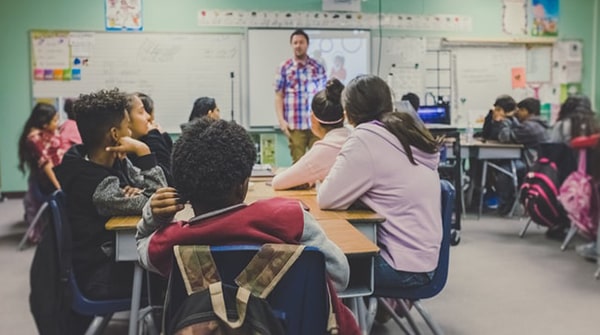There’s nothing new under the sun. While this can seem like a bleak statement, it’s actually very comforting when presented with challenges as a society.
When people aim for better education as a community, they find better solutions to problems that have been around since civilization began. Here’s a quick overview of why society should focus on better education as a whole.
Equal Education
Education has always been nationalistic. Just look at any country around the world with a strong economy and you’ll see a country that invested in the education of its citizens.
Just having basic primary school knowledge isn’t enough either. Countries aim to present their citizens with a culture that represents a strong image of belonging.
When Singapore emerged as a technological leader, the country’s government had already put decades into helping students excel in spatial learning. Now, Singapore math is regarded around the world as the ticket to helping students blend logic and creativity.
The spatial and visual elements of math open up students’ minds to see solutions easier in the real world. Of course, it’s helpful when these options are presented to both boys and girls.
Equal education is a major issue around the world even for countries that actively seek a better education for their citizens. Here’s a look at how unequal education kills innovation for societies that hope for stronger economies.
More Innovation
The world’s population isn’t equally male and female. It’s also not divided equally among ethnicities, skin color, or financial wealth. There’s a diversity around the globe that’s overwhelming even when it comes to something as simple as language.
Each person on the planet has a mind ripe for innovation in some form. Whether it be in the form of inspiring someone else to see a problem and move toward a solution or having a genius-level IQ, people can contribute to building more innovative societies.
What’s the biggest barrier to tapping into the talent resources in communities around the world? Unequal education, bias, and social discrimination.
When we present education only to a specific group of people, we ignore billions of opportunities for innovation. It is estimated that 1 in 400 people have a ‘genius’ level IQ.
This means that in the world there are roughly 200 million people capable of performing at superior levels when it comes to computing information. This is an incredible number of people who can advance communities forward with little to no effort at all.
There’s an even higher number of people with superior emotional intelligence that excel at social interactions with others. This is important to understand because information by itself doesn’t bring people together.
Having social and interpersonal skills to deliver information in a way that’s appealing to general populations is one of the best methods to spread better education. Places like The Center For Advancing Opportunity help balance out the potential of communities by focusing beyond their social status to provide them with ample opportunity.
Patent Discrimination
No country is perfect. There are issues linked to religion, racism, caste, and gender dating back thousands of years around the globe.
But America is in a unique position. It’s a relatively young nation. That means there isn’t a precedent of religious conflict or rival nations creating an almost irreversible feud among its citizens.
There are tribes in South Africa, for example, that have feuds dating back centuries that present a major political barrier to progress. But not in America.
All of the opportunities for progress are ripe in this country established under the ideals of creating a new world for Europeans. The decision to introduce slavery as a social system based on skin color immediately excluded talent that could have made Americans progress at a much faster rate.
Geniuses like Katherine Johnson and Benjamin Banneker were excluded from their full potential of innovation because of racism. A recent NPR report revealed that racial violence against black American communities following Plessy vs. Ferguson almost halted the filing of patents by black inventors.
The black inventor community was rapidly growing and thriving up until 1899 when the Plessy vs. Ferguson ruling happened. This ruling meant black inventors couldn’t attend the same trade shows or collaborate with other like minds within the scientific community.
Their options for filing patents were limited in certain spaces where blacks didn’t have access. This is a shameful period for a country struggling to emerge as a leader in innovation.
There was a desperate attempt to showcase European men as geniuses and leaders to justify the nation’s horrifying past. But there is still a path forward.
America is Missing Out on Resources
As America acknowledges that shared innovation means ignoring social and economic status, Americans of all backgrounds will assume they have the right to contribute. Descendants of former slaves have a legacy of survivalism.
Surviving racial violence. Surviving the push for modern free labor. Surviving redlining. Surviving social discrimination.
This isn’t a ripe place for new ideas to grow. In fact, it’s a mindset that serves to sabotage the ideals of America.
Let’s heal the trauma of American communities with a better education. An education that reflects a path forward that reveals solutions to age-old problems.
Helping Communities through Better Education
One of the major benefits of global education is finding models that work. When you don’t think of yourself as better than someone else, you’re more willing to learn from them.
The trouble with an education based on imperialism is that it assumes that Americans and Europeans have the most information. They’re the ones doing the sharing instead of being taught.
It ignores obvious solutions to problems based on the ethnicity of the person presenting the solution. By focusing on better education for all people, the world benefits.
Fragile Communities Get Stronger
There really isn’t anything new under the sun. All nations have something to gain and learn from one another.
Let’s focus on better education that encourages an open mind. It doesn’t mean replacing your culture or being ‘conquered’ by someone else’s ideas.
It means allowing progress to happen without sabotage. For more information and tips, visit our blog for updates.





